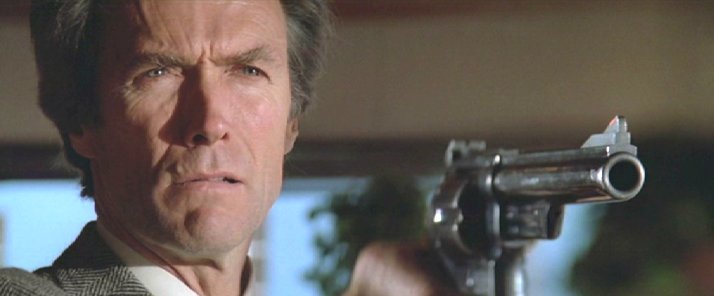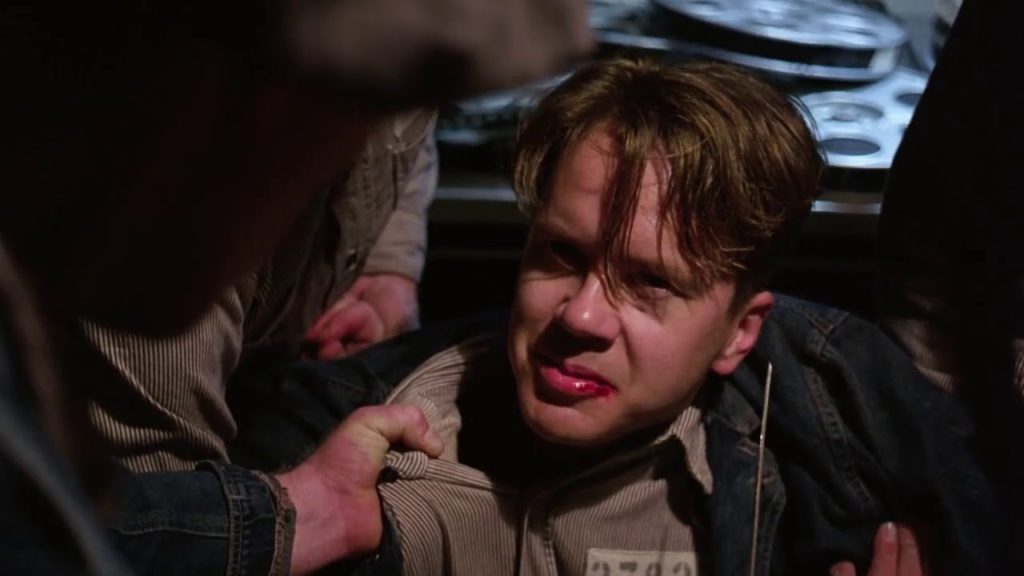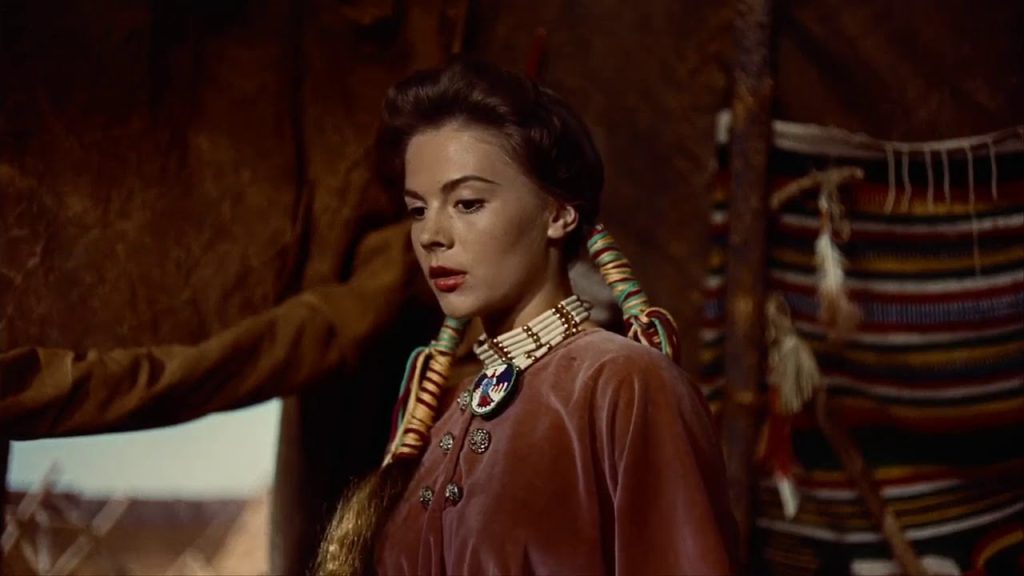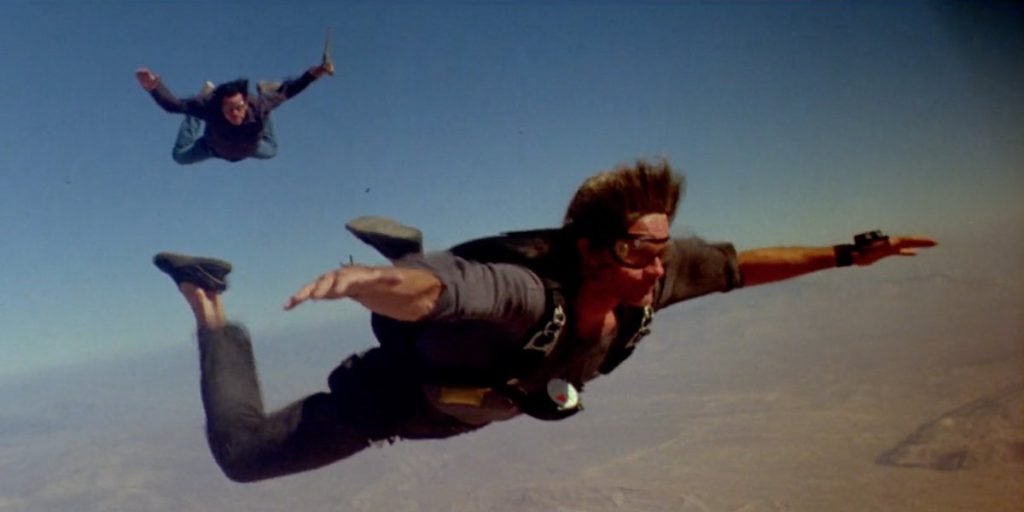
Named after their famous catchphrase, the Pythons’ first movie is actually a rehash of sketches from their 1969-70 TV shows. Despite that, And Now for Something Completely Different is brilliant from start to finish, a staggeringly well-chosen compilation that includes The Lumberjack Song, The Dead Parrot, and Upper Class Twit of the Year.
It’s also a joy being reminded of the quality of some of the lesser known skits, such as the negligee-clad housewife who lures milkmen to their doom or Terry Jones playing his ‘musical mice’ by simply thumping them with a mallet.
Intermittently interrupting proceedings is Graham Chapman’s po-faced colonel. Perhaps an embodiment of the viewers who either didn’t get Python or objected to some of its material, he often summarizes a just-aired sketch before giving it the thumbs down for being ‘too silly’.
For example, he admits to quite liking the Hell’s Grannies (fearsome old women terrorizing passersby) but dislikes the way it led the show into highlighting other public nuisances, such as a gang of vicious Keep Left signs.
“Stop this sketch,” he pompously insists. “It’s silly.”
Decades after first encountering this uptight military figure, I find he still pops into my head whenever a movie (that may have started well) goes off the rails.
Here are seven moments that always prompt him to materialize.

Inspector Harry Callaghan talking tough in Sudden Impact
Dirty Harry is essential viewing. Its follow-ups, Magnum Force and The Enforcer, are several notches down but still highly watchable fun.
And then there’s the third sequel in which the aging Callaghan is somehow so terrifying he manages to induce a crime lord’s fatal heart attack by talking to him.
And when I say talking to him, I don’t mean a grueling seven-hour interrogation in the cop shop. No, I mean by having a conversation at his granddaughter’s wedding surrounded by other guests. Whatever chance the movie had (and frankly not much after a poor opening) is well and truly sunk from the 14th minute onward by this wretchedly inane scene.
Anyhow, after barging past the muscle, Callaghan finds the gangster Threlkis sitting next to the bride at a packed table. Threlkis is friendly at first, even offering champagne, but a badass like Callaghan doesn’t do chitchat and the social niceties. He proceeds to lower the genial tone by informing everyone a top class hooker has been fished out of the drink with her face smashed to a pulp. Implying Threlkis was a regular squeeze, he then retrieves a wad of paper from his jacket pocket saying she’d written down some very revealing pillow talk.
“Maybe she didn’t even tell about it when she was being tortured and beaten,” Harry says as the gangster’s mouth begins twitching, his veneer of smug civility already in tatters. “I wonder what that old scumbag’s bosses are gonna say when they find out.”
By now Threlkis is so upset at Callaghan’s bad manners he can’t even swear properly, let alone ask to see this damning document or perhaps summon a lawyer. Concerned familial hands clutch at him, but they’re unable to stop him falling face down dead onto the table.
Job done in ninety-three seconds flat.
Callaghan strides away, probably pleased he didn’t even need a bullet.
And no, I can’t detect any tongue in cheek here. It’s the silliest scene in the film but, then again, Sudden Impact is little more than a series of ridiculous incidents slung together. At one point our hero gets lumbered with a snuffling, farting bulldog. It’s the moment the great Harry Callaghan, the man who took down that evil bastard Scorpio, finds himself mired in the land of the sitcom. I haven’t seen the final installment, The Dead Pool, but presumably that’s the one in which he starts making mother-in-law jokes.

The dancing garbage in American Beauty
“There’s nothing worse in life than being ordinary,” Mena Suvari tells her best friend Jane in this initially decent Oscar-winner. Actually, sweetie, there is. Terminal cancer or being stuck drooling in a wheelchair for a start. Still, you can’t expect much insight or even common sense from a privileged, desperately insecure wannabe model. At least you’re supposed to laugh at how far up her own ass such a teenager is.
Less easy to forgive is the way Jane’s newly-arrived next-door neighbor, Ricky, is clearly presented as grounded and much more in touch with the things that matter. He’s a high-end pot dealer who obsessively videos whatever’s going on around him.
Not that he’s got the slightest grasp of quality control.
“You wanna see the most beautiful thing I’ve ever filmed?” he asks Jane before sitting her down on the couch to show her a plastic bag in front of a brick wall eddying in a wind pocket.
“It was one of those days when it was a minute away from snowing and there was this electricity in the air,” Ricky begins over a soft piano score, his eyes already welling at the sight of the swirling bag. “This bag was just… dancing, like a little kid begging me to play with it. I realized there was this entire life behind things and this incredibly benevolent force that wanted me to know there was no reason to be afraid. Ever. Sometimes there’s so much beauty in the world I feel like I can’t take it and my heart is just gonna cave in.”
Excuse me, while I puke. Hands down, that has to be one of the worst attempts in all of cinema to pass off pretentious guff as insight and meaning. Worst of all, though, is the way in which this bilge works. Jane immediately clutches Ricky’s hand to indicate connection before they share a first kiss.
The movie never recovers. Soon after we’ve got the groan-inducing character arc of a secretly gay homophobe before that flat-out fraud Ricky pops up again to try to convince us there’s beauty in violent death, too.

Some fishy goings-on in The Spy Who Loved Me
Roger Moore remains my favorite Bond because he always understood the character’s essential ludicrousness. By that I mean 007 is the perfect fantasy fodder for men and women. Men wanna be him, women wanna get fucked by him. Hell, there’s probably quite a few men who wanna get fucked by him, too. Indeed, Bond packs such an impossible amount of desirable attributes into one person that he’s cartoonish. Moore grasped this, his amiable performances always on the verge of winking at the camera.
Spy is not only the best Roger Moore movie, it can also lay fair claim to be the best Bond period. Its bravura pre-titles opening is particularly good, featuring the theft of a nuclear sub and a gun-toting downhill ski chase that ends with Moore zooming off a cliff and memorably opening a Union Jack parachute.
It’s also the movie which introduces Jaws, a giant, metal-toothed villain. Played by the seven-foot tall Richard Kiel, he deservedly became an instant hit. And it’s this guy who provides my Graham Chapman moment.
After a fight on the baddy’s underwater base, Moore use a giant magnet to pick Jaws up by his metallic gnashers and drop him into a shark tank. Get it? Jaws is gonna fight Jaws. And although we’ve earlier witnessed this beast’s lethalness, it’s no match for this human opponent. Jaws grabs hold of it like it’s nothing more than an oversized goldfish and begins biting. Blood pours out and ten seconds later the underwater contest is over.
Sigh.
I dunno, there are so many what the fuck moments scattered throughout the Bond canon that perhaps it’s unfair to pick on one. Even in Spy, Jaws survives an earlier attempt on his life when a bullet ricochets off his teeth. And didn’t one of the later Bonds have an invisible car?
It’s just this piscine palaver has always struck me as the silliest.

Avoiding oral rape in The Shawshank Redemption
This flick is apparently the best of all time or at least the most popular. Now I can’t quite see what all the fuss is about, but I’m not going to be one of those tedious contrarians. It’s a slickly entertaining piece of pure Hollywood right through to its pie in the sky ending. However, I’ll take Scum over it every day, particularly when it comes to the realities of sexual abuse in prison.
Pretty boy Andy Dufresne (Tim Robbins) is banged up for murdering his wife and lover. During his first night inside a fellow ‘new fish’ is publicly beaten to death by the sadistic, nightstick-wielding captain of the guards. There are other things to worry about, too. Namely, a charming group of chaps known as the Sisters.
“I don’t s’pose it would help if I explained I’m not homosexual,” Andy muses to Red (Morgan Freeman) in the prison yard.
“Neither are they,” Freeman sagely replies in his archetypal Noble Black Man role. “You’d have to be human first.”
These violent predators eventually bundle Andy into a projectionist’s room during the screening of a Rita Hayworth movie. Savagely beaten and forced to his knees with both arms pinioned, it’s pretty obvious what’s coming next.
“Now I’m gonna open my fly and you’re gonna swallow what I give you to swallow,” the Chief Sister says, waving a vicious-looking shank in Andy’s face.
All good so far. I’m sure this is how a lot of prison rapes go down.
Andy’s not having it, though. “Anything you put in my mouth, you’re gonna lose,” he replies in a weirdly confident way.
Chief Sister shakes his head. “No, you don’t understand,” he says, obviously relishing the cozy chat while indicating the shank. Oh boy, is he gonna teach this bitch a lesson. “You do that and I’m gonna put all eight inches of this steel in your ear.”
Andy is still somehow unfazed. “All right,” he counters, “but you should know certain serious brain injuries cause the victim to bite down hard. In fact, I hear the bite reflex is so strong, they have to prize the victim’s jaws open with a crowbar.”
Doubt appears on Chief Sister’s face. His eyes flicker uncertainly to a cohort. You can almost hear their resolve to commit sexual mayhem crumbling.
The shank is lowered.
And that, ladies and gentlemen, is all it takes to halt this seasoned predator, even though he’s in total control of the situation. Two highly improbable sentences from a kneeling, immobilized man. In three seconds flat Andy’s mind games have jellified an animalistic man hell-bent on getting his illicit jollies.
You have got to be kidding.
For fuck’s sake, why doesn’t he hold the shank at Andy’s throat instead? Or just kick his teeth out? The whole sequence is beyond ridiculous. If the colonel ever saw Shawshank, his head would explode.

Ethan Edwards copping out in The Searchers
Revered by important directors, it takes almost two hours for this hugely influential western to drop the ball.
Ethan Edwards (John Wayne) is an embittered loner who went missing after the civil war. When he finally shows up at his brother’s Texan homestead three years later, there’s a sense something’s broken. Gruff isn’t the word for this guy. “I don’t believe in surrender,” he says about being on the losing side, the first time we’re given an insight into his dogged nature.
Soon after his arrival, he falls for a Comanche ploy and three of his family get slaughtered. Two nieces are also abducted, including eight-year-old Debbie.
“Put an amen to it,” he tells the preacher at his sister’s graveside, desperate to get the hunt for the perpetrators underway. It’s a quest that quickly turns obsessive, fuelled partly by righteous anger but also by ingrained racism. Oh boy, does he loathe Indians. He even shoots a dead one through both eyes to fuck up the warrior’s afterlife.
A failed attack on their camp results in the posse being whittled down to three before the older niece’s body is discovered in a canyon.
“Did they…” the boyfriend asks. “Was she…?”
Ethan explodes into rage. “What do you want me to do? Draw you a picture?”
The boyfriend rides off to tackle the Comanche alone, quickly getting killed and leaving just Ethan and Debbie’s adopted brother, Martin, to continue the search.
Seeking shelter at the ranch of the dead boyfriend’s parents, Martin is clearly worried about what Ethan will do if they ever catch up with Debbie. “That’s what I’m afraid of,” he says. “Him finding her. Oh, I’ve seen his eyes at the very word Comanche. I’ve seen him take his knife and… Never mind. He’s a man who can go crazy wild and I intend to be there to stop him in case he does.”
At the root of Ethan’s neurosis is his terrible fear of Debbie not only losing her white identity but the rapidly growing threat of sexual contamination. When they finally catch up with her, Ethan’s nightmare is partly revealed to have come true. She is now dressed in Indian clothes and speaks their language. She orders him to go, adding a last humiliation by saying: “These are my people.”
Enraged, Ethan pulls out his gun, intending to shoot the ungrateful bitch dead. Martin shields her, but the Comanche intervene and snatch up Debbie again.
There’s nothing left for Ethan to do, but cut her out of his will as he’s adamant he no longer has any blood kin. “Living with Comanche ain’t being alive,” he says.
Clearly, the teenage girl is soiled, tainted beyond repair. Good riddance to bad rubbish.
But a few months later he gets word of her whereabouts. This time he leads a raid backed by the US cavalry, happily scalping the Indian war chief who abducted Debbie in the first place. His bloodlust up, he dementedly pursues her on horseback until she collapses. Finally, after a five-year long odyssey across vast distances through blizzards and treachery, the moment has arrived to punish her race betrayal.
So what does this man who kills without hesitation do?
He sweeps her up and… and… murmurs: “Let’s go home, Debbie.”
There is no bigger copout in cinema. Graham Chapman doesn’t so much protest at this one as just hang his head.

Keanu Reeves taking a dive in Point Break
Surfing bank robbers, eh? Fair play, this one earns some points for originality, even if it’s little more than testosterone-fuelled men engaged in territorial pissings while swinging their cheesy bollocks at one another.
Keanu Reeves is introduced in a chest-hugging T-shirt on a rain-lashed firing range as the unlikely-named FBI agent, Johnny Utah. With his puppy dog eyes and chiseled features, this magnificent alpha male specimen is so pretty that Point Break should come with a warning for straight men that more than a half-hour’s viewing might turn you gay. Hell, I watched the entire two hours and immediately signed up for a hairdressing course afterward.
Reeves is after Patrick Swayze’s sun-kissed criminal ass. Swayze’s the chief bad guy of the Ex-Presidents and a relentless adrenaline junkie. If he isn’t scaling mountains or skydiving, he’s storming bank after bank with his masked, heavily armed crew. Mind you, this guy never thinks of quitting.
Why?
Well, as he tells his cronies staring into a beachside campfire while accompanied by the sound of the surf, it’s not about the money.
“It’s about us against the system, that system that kills the human spirit,” he says, getting to his feet just so you know he means it. “We stand for something. To those dead souls inching along the freeway in their metal coffins we show them that the human spirit is still alive.”
Yes, that’s definitely the perfect justification for terrorizing people with shotguns.
Anyway, this is a movie that tries hard to capture the whole surfing vibe. In pretty much every scene there are taut abs, spunky chicks, sun-bleached, shoulder-length hair, tequila drinking, Hawaiian shirts and board shorts, partying to Hendrix in beachside houses, talk of epic 50-year storms and spiritual guff about riding waves, lovemaking on the beach and, of course, the ocean’s ceaseless majesty. It certainly made me wanna hang out with this free-spirited bunch, even if I do hate the sun, sand, and sea.
Oh, and surfers.
But even if it would’ve been nice to see Oddball and Kilgore join the party at some point, we still have a chunky, permanently enraged Gary Busey calling people ‘squid-brain’, Chili Pepper Anthony Kiedis getting his foot blown off, Keanu’s pert buttocks on display in a wetsuit, and Ronald Reagan catching fire. Point Break is pure popcorn entertainment, although it starts to edge the colonel into view when Reeves does his first solo parachute jump not only with a wrenched knee, but without any training or instruction. Twenty minutes later the movie needs to be stopped for going batshit crazy.
After his partner’s been murdered, Reeves finds himself in a plane with the soon-to-be-departed Swayze hanging onto the doorframe. “I know it’s hard for you, Johnny,” he says. “I know you want me so bad it’s like acid in your mouth. But not this time.” Swayze chucks his handgun onto the floor to give a grinning salute. “Adios, amigo.”
Then he’s gone, falling more than two hundred feet a second.
Now we already know Reeves is a confident sort of chap, earlier described by a straight-talking boss as being young, dumb and full of cum. But is he really gonna plunge after his nemesis without a goddamned parachute?
You betcha ass.
He grabs the discarded gun and off he goes, zeroing in on his target like a peregrine falcon rather than a novice skydiver partaking in only his second jump. He slams into Swayze, causing him to understandably remark: “You are crazy!” They grapple for a while, but Swayze won’t pull the chute while continually daring Reeves to pull the trigger. Reeves has to drop the gun to open the chute, managing to do so about ten and a half feet from the ground. No matter, it’s enough to slow their maniacal fall, even if they do endure a rough landing.
“God damn!” Swayze cries, jumping to his feet. “You are one radical son of a bitch!”
Fair comment. I doubt even Graham Chapman could have put it better.

Returning to play the second half of a soccer match in Victory
This is the wonderfully daft one in which a pre-Rambo Stallone tries his hand at soccer, the first of many mirth-inducing occurrences that contribute to the flick’s faintly surreal air. It wants to be a stirring drama about character and self-belief. Instead it winds up like a big budget version of ‘Allo ‘Allo.
Life in a WW2 prison camp ain’t much fun, but at least those beastly Krauts let the lads kick a ball around now and again. The newly arrived Major Steiner (Max von Sydow) is being given a tour when the ball breaks loose, prompting him to trap it under his foot. Stallone bounds up to him.
“Please, sir,” he says, sounding like he’s talking to a bigger, rougher boy, “can I have my ball back?”
Stallone then tackles an opponent gridiron style, prompting his captain John Colby (Michael Caine) to send him off.
“You cannot tackle like that in soccer,” he shouts, impersonating an ex-pro soccer player about as well as a ladyboy in Dressed to Kill. “I’ve been telling you that for a bloody year! You use that American style here again and you’ll be barred.”
A bemused Stallone trudges off. “What kind of game is this?” he mutters. “For old ladies and fairies?”
Anyhow, it turns out Major Steiner used to play soccer for Germany before the war and is keen to organize an exhibition match. In the blink of an eye, things get escalated and the game will be played at a stadium in Paris in front of the German High Command.
“That’s crazy,” is all Colby can say. Yes, mate, it sure is.
The first half, played before a 50-000-strong crowd, is little more than a display of German roughhousing and cheating. Pele, at that time the world’s most famous real-life soccer player, is badly tackled and forced off with damaged ribs. They all look sad, even the German brass, which is a bit of a surprise given they’ve allowed a black dude to play in an exhibition match. However, Stallone (somehow now the goalie) fares even worse. He gets kicked in the face after winning the ball. Mein Gott, was Rambo ever treated this meanly?
The team limps off at halftime 4-1 down. Colby’s fairly upbeat, though. “We scored a goal,” he excitedly tells the recovering Pele in the changing room.
At that moment (and in a minor miracle of timing) the French Resistance tunnelers break through the underneath of the bath. (The Germans haven’t posted a guard with the players because it’s against the Geneva Convention for a German to see an Englishman in his underpants). Stallone quickly explains the details of the well-organized escape plan to the rest of the lads as Colby starts merrily climbing down the ladder.
But neither have reckoned with the collective stiff upper lip of the British and their insistence on fair play.
“Hold on,” one of the hesitating players says. “I don’t wanna go. We can beat them.”
“Yeah,” another agrees. “We’ve still got a chance. It’s not as if we’re being slaughtered, skipper.”
Colby, along with the viewer, can barely believe his ears. “You mean, go back and play the second half?”
Yes, that’s exactly what these dunderheads mean. Why escape from the hell of a prison camp with all its attendant possibilities of disease, malnutrition and execution when you can demonstrate to Jerry through a jolly game of soccer that their wicked ways will not prevail? It’s a bold metaphor, you see. Beat Jerry on the pitch and it suggests victory on the battlefield will follow.
Stallone, however, wants none of it. “What the hell’s the matter with you guys?” he shouts, storming off down the very nice tunnel. “You wanna go back to prison?” You know a movie’s in real trouble when there are about fifteen blokes onscreen and the most sensible one is Stallone.
Colby, who ten seconds earlier was all for getting the fuck outta there, has since been sipping the Kool-Aid. Or sniffing glue. Or something. “We can win this,” he says, with the fever light of insanity gleaming in his eyes.
Still, he’s not so stark raving mad that he can’t recognize the resultant impact of Stallone’s disappearance on the team. Firstly he tries encouragement, calling him “not a bad goalie” before resorting to moral blackmail. “If you don’t come back, we can’t go. We can’t go back without the goalie.”
Pele then adds his two cents. “Please,” he says, all doe-eyed. “It means a lot to us. If we run now, we lose more than a game.”So what do you think they do? And do they win? Well, I won’t spoil things too much, but if you look closely at the players on the pitch during the second half, I swear you can see Graham Chapman running around.
Dave Franklin also writes novels.